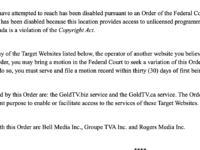As the witness portion of the Canadian Heritage committee hearing into the Online News Act (Bill C-18) comes to a premature end later this week (a hearing is planned with Heritage Minister Pablo Rodriguez and the CRTC, but remarkably Facebook, the CBC, and many experts will be blocked from appearing), new data from the Parliamentary Budget Office calls into question the claims of big benefits for Canadian newspapers. In fact, while the government has been anxious to cite the (questionable) PBO estimate that the bill will generate $329 million per year for Canadian news organizations, last week the PBO quietly released supplementary data that suggested it believes the vast majority of the money will actually go to the CBC, Bell, and other broadcasters. In fact, the supplementary data – posted with a link after the release of the PBO’s report – concludes that newspapers will receive less than 25% of the funding or about $81 million to split among hundreds of news outlets.
Post Tagged with: "bell"
Bell on Bill C-11: Limit Consumer Choice, Weaken Competition, and Legislate Access to Cheap U.S. Content
Just over 11 years ago, I wrote a column for the Toronto Star titled U.S. Web-Streamed TV Could Change Game for Canadian Broadcasters. The piece argued that Internet streaming of television was in its infancy, but could soon become the norm with major implications for Canadian broadcasters:
While the use of the Internet to by-pass Canadian broadcasters is still relatively rare – most U.S. programs bundle the broadcast and Internet rights together – the decision to stream the games directly into the Canadian market could soon become the norm. The key determinant will obviously be money. Once U.S. rights holders conclude that it is more profitable to retain the Internet rights so that they can stream their programs online to a global audience and capture the advertising or subscription revenues that come with it, Canadian broadcasters may find that they can only license broadcast rights with the U.S. rights holders competing directly with them via the Internet.
I continued by noting that the Internet was on the verge of disrupting the longstanding Canadian broadcast model and its reliance on cheap U.S. programming. I speculated that the result would be that Canadian broadcasters would recognize the need to create their own content that they could licence online around the world.
That column came to mind during Bell’s appearance before the Heritage committee on Bill C-11 yesterday.
Deja Vu All Over Again: Looking Back at Two Decades of Bell, Telus and Rogers Battles Over the Canadian Wireless Market
In the weeks leading up to the CRTC hearing on wireless services, there was no shortage of corporate lobbying, opinion pieces from telecom company consultants downplaying concerns about the competitiveness of the Canadian wireless market, and comments from company executives threatening to reduce investment if the CRTC mandated new competitions through MVNOs. Those claims have continued this week throughout the hearing.
Independent studies from around the globe have for years (here, here, here, here, here) found that Canadians face some of the highest wireless prices in the developed world. Yet if the usual claims of a fiercely competitive, reasonably priced wireless market provides a sense of deja vu, consider:
Canadian Copyright Website Blocking Underway As TekSavvy Appeals Federal Court Ruling
Last week I wrote about a federal court ruling that opened the door to copyright website blocking in Canada without Parliament establishing site blocking rules or the involvement of the CRTC. The decision is flawed from both a policy and legal perspective, substituting the views of one judge over Parliament’s judgment and relying on a foreign copyright case that was rendered under markedly different legal rules than those found in Canada. I concluded by noting that the case should be appealed and just over a week later, TekSavvy, the independent ISP that stood alone in contesting the blocking order, did just that. Even as the appeal was launched, however, the major Canadian ISPs began blocking access to the specific webpages identified in the court order.
Self-Serving in the Extreme: Bell’s Broadcast and Telecom Submission to the BTLR Revealed
The government’s expert panel on broadcast and telecommunications law reform is expected to release its preliminary report on the results of its public consultation next month. The panel has remarkably kept the submissions to the consultation secret, rejecting an open and transparent policy making process that the government insists is essential to good policy development. I filed an Access to Information Act request for some of the more notable submissions (some have been made available and are posted online by the FRPC). An interim release of that request just arrived in my inbox and I’ll have a couple of posts on point over the next few days.











